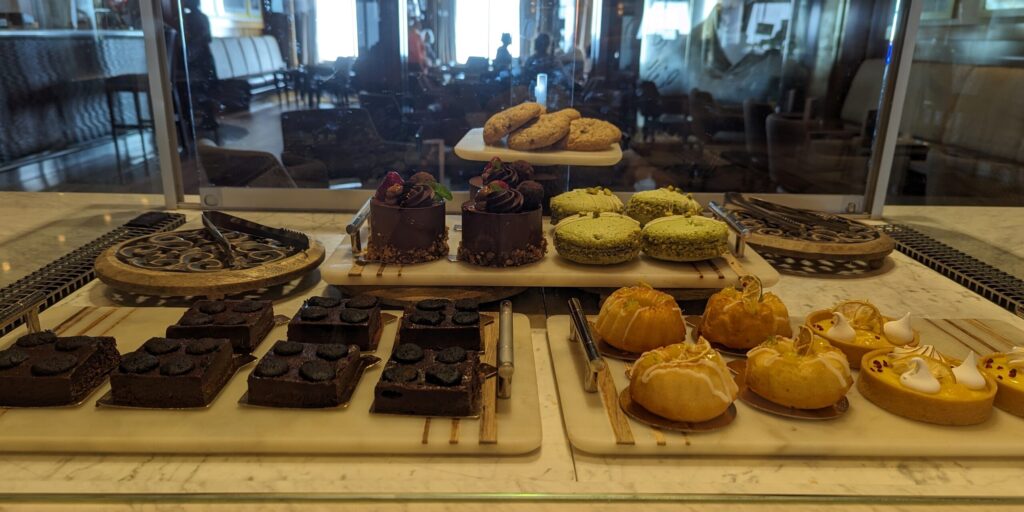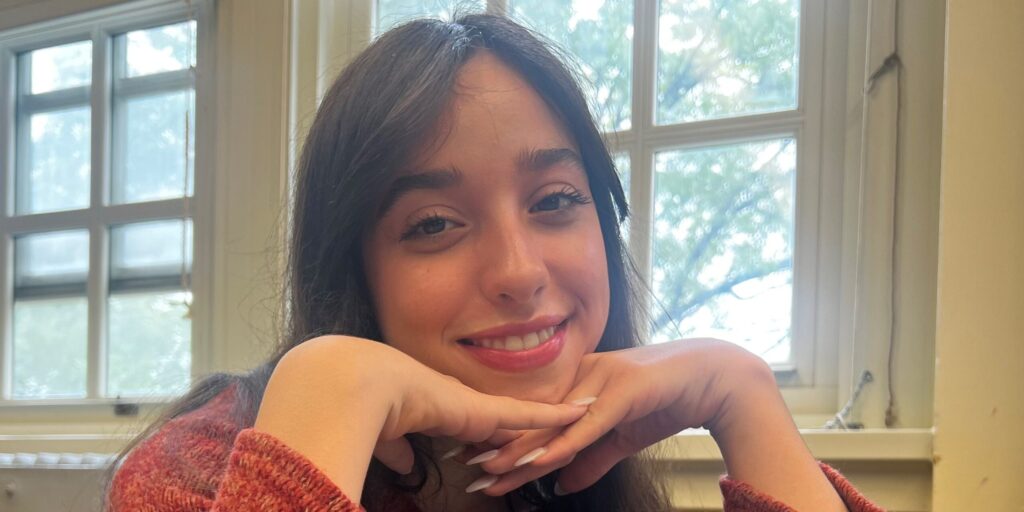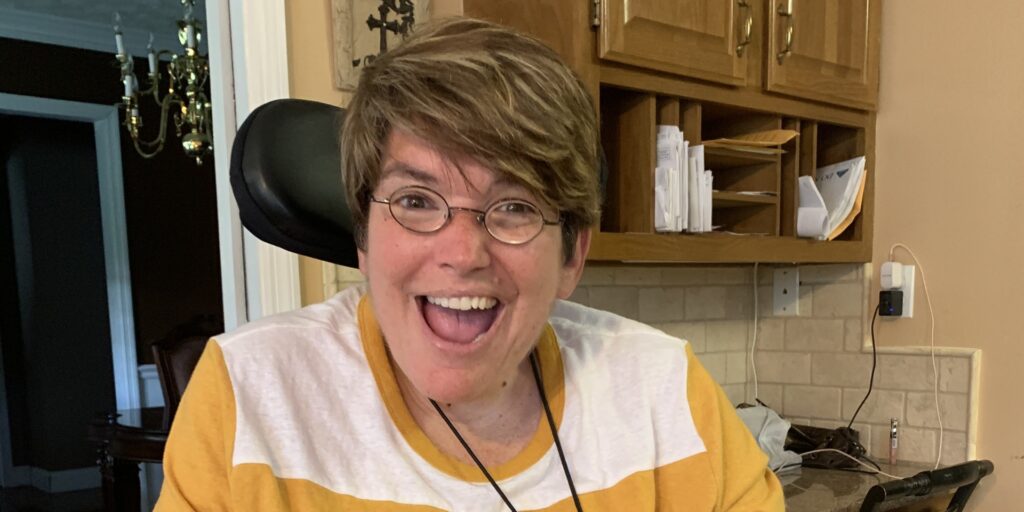
Hacking COVID: Voices from the Community, Part 3
By MDA Staff | Tuesday, June 9, 2020
In April, MDA fielded a survey to ask its community how COVID-19 was impacting their lives. We heard your responses — anxiety, questions, hope — and wanted to know more. In this six-part blog series, Hacking COVID, people from MDA’s community, all living with neuromuscular diseases, shared how they’ve altered their day-to-day lives, how they’ve “hacked” situations like getting groceries and receiving assistance, how they’ve maintained contact and safety in an uncertain time.
MDA encourages all families to follow the guidelines put forth by the U.S. Centers for Disease Control and Prevention. Access our latest news and resources on our COVID-19 resource page.
Here’s what some have been doing.
Cindy Hiestand, 47, lives with Charcot-Marie-Tooth disease (CMT) 1F. She resides in Ringgold, Ga., with her husband, Bob, and son, Will, 14, who also lives with CMT1F.
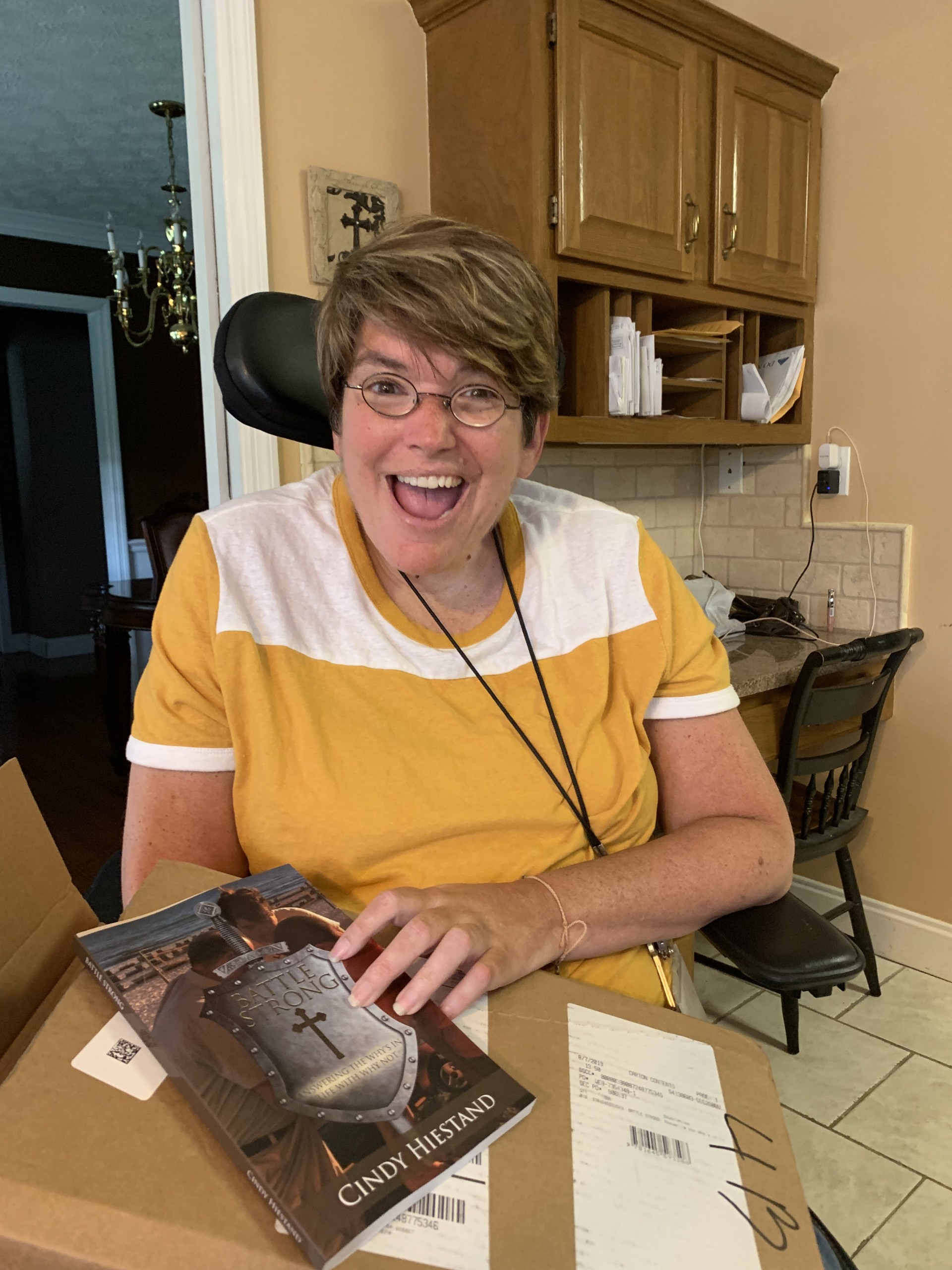
Cindy Hiestand
How has the threat of COVID-19 changed your day-to-day routine?
Professionally, I am a speech pathologist working with kids with multiple abilities. I am used to seeing my kids at school during therapy, where we have a lot of interaction, including laughing, high-fives, smiles, and occasional hugs for a good job, etc. Communication is a huge part of every day at school, as some of those kids look forward to praise from all of the people at school. That has been greatly missed.
Also, professionally and personally, I am an author. I was doing public speeches at certain schools and churches to discuss things about my disability and situations from it. I have greatly missed going out and talking to people about how things that seem to be negatives can be turned into positives depending on how we view them.
How have you adapted to those changes? What tricks have you discovered to make things work?
Overall, I have adapted well because I have filled my time with positive things.
What has been the hardest change?
I have missed seeing my coworkers and my students at school because we always had the best time. Work isn’t just a job; it is a part of my life that I look forward to, where I feel like I don’t need the help but I can give the help. That meant a lot to me mentally and physically.
How have you been coping?
For work, I have done video speech [therapy sessions] and called all of my students’ parents and met with my students on video. That has been absolutely awesome for me and the kids. As far as the book goes, I have had time to connect with a lot of people on Facebook and in emails about inspirational topics. Personally, I have gotten to spend unrushed time with my family and that has been awesome! I have gotten to be a part of my son’s schooling every day and see and contribute to what is going on with him. My son and I have had a lot of time in the evenings to watch movies together and converse about whatever he needed to, or myself. I feel like this time has given us extra time together, which, whether we all realize it or not, we need.
With friends, I have made more of an effort to connect with them either by text, phone call, or video chat. I never had time to do a lot of those things before, but because of this, I have. Spiritually, I have had much more time to read, or listen to songs that I need to hear on a daily basis but do not have time to in my regular schedule when I’m traveling to work and dinner out. That has been a huge blessing.
What new routines might you keep in place beyond the COVID era?
I will definitely make more time for family, friends, and spirituality! Those are the things we always need to make us the best person we can be!
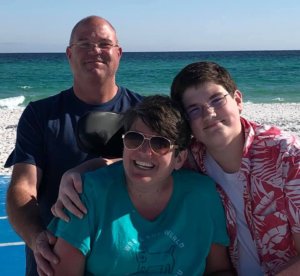
Will Hiestand; dad, Bob; mom, Cindy
Will Hiestand, 14, lives with CMT1F. He resides in Ringgold, Ga., with his dad, Bob, and his mom, Cindy, who also lives with CMT1F.
How has the threat of COVID-19 changed your day-to-day routine?
I have only been out once since Georgia declared a shelter-in-place order, and that was for a haircut, taking every precaution possible, including wearing a mask and gloves. [The pandemic] has really made us focus on our safety a lot more than we ever have before.
How have you adapted to those changes? What tricks have you discovered to make things work?
I have adapted very well to the changes as I have always been somewhat [germ conscious]. I have just taken safety precautions to a whole other level since the start of the pandemic. Tricks I have discovered to make it work include wearing something, whether it be a mask or even a cloth, over my face in public to protect my nose and mouth, along with gloves to make sure I am not touching anything that may contain the virus, staying 6 feet or more away from anyone that I see, if possible, etc.
What has been the hardest change?
The hardest change has been not being able to see any of my friends and teachers outside of video calls.
How have you been coping?
I have been coping by spending a lot of my time with my family. We have watched about four movies a week since the start of our shelter-in-place order so we can have good laughs in this extremely sad and challenging time.
What new routines might you keep in place beyond the COVID era?
I am going to keep in place our family movie time because it has been so nice getting to share laughs with my family all the time. Also, for a while after, I might continue trying to keep my distance from people as much as I can.
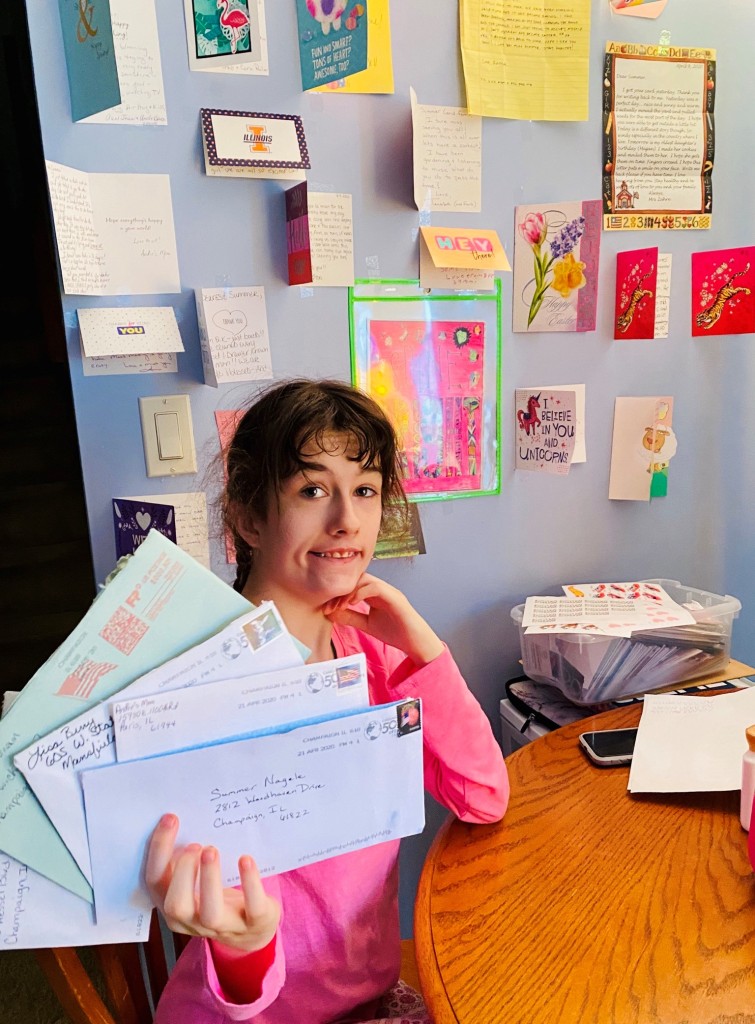
Summer Nagele
Summer Nagele, 15, lives with congenital myasthenic syndrome (CMS). She resides with her parents, Autumn and Michael, in Champaign, Ill.
How has the threat of COVID-19 changed your day-to-day routine?
I have not been out in public with friends and family since March 11, and my mom has not been out in public since March 14. Instead of going to school, I wake up, eat breakfast, and get on my computer to work on schoolwork. Since March I have not played any Special Olympics sports, gone to voice lessons, been a part of MDA fundraising events including our event — Bunny’s Bash for MDA — hung out with friends, worked one-on-one with my physical therapist and occupational therapist, gone to doctor appointments or seen my family weekly. I am a very social girl, and right now, aside from window or porch visits (I stay on the porch and friends stay on the front walk), it’s just me, Mom, and Dad.
Mid-March, I decided to try and remain as positive as possible during these unique times. Although I cannot see my friends, I FaceTime, send letters through snail mail (more than 140 so far), and Zoom with family and MDA Summer Camp friends. I get excited when I get letters and packages and look forward to opening them the next day, after we let them sit for 24-72 hours in the garage.
We take a lot of walks, shoot a lot of hoops, do crafts, watch TV, and play games. I am doing more TikTok [videos] and learning many new dances, which is fun. I missed volunteering for my community, so my mom and I have made more than 250 masks to donate to public health. Staying busy definitely helps me stay positive. I decided to pick some flowers from my yard and attach a note that said, “I hope this brightens your day,” and delivered them to everyone on our block. This made me feel really good inside.
How have you adapted to those changes? What tricks have you discovered to make things work?
My dad now goes to the grocery store every two weeks. Mom wipes down all the perishables with Clorox wipes, and we leave all the non-perishables in the garage. All mail goes into the garage and sits in quarantine for 24-72 hours. My dad is the only one who goes out in public because my mom is immunocompromised as well. When Dad does come home, he undresses in the garage, puts all his clothes in the washer, and showers right away. Mom wipes down surfaces daily, and we wash hands many times throughout the day. We do occasionally order groceries for delivery if we run out of things before the two-week grocery trip, and everything gets taken from the front porch directly to the garage. My dad is working from home which is different, but I love it.
Each day we talk about what we are grateful for and this helps us remain positive. Some of the things I am most grateful for are: our health, food and shelter, nice days, friends who write letters, a basketball hoop, and that my dad is able to work. When I talk to my friends, we end our conversations with the three best things about our day. When I focus on the good it is hard to feel sad or angry about coronavirus.
What has been the hardest change?
By far the hardest thing has been not seeing or being able to hug my friends and family.
How have you been coping?
Most days I do pretty well because I choose to be positive and see the silver lining that each day brings. On the days that I do feel sad or restless, I talk to my parents about what I am feeling and try to do something positive for others (write extra letters, drop flowers at neighbors’ houses, compliment friends on FaceTime, etc.). Once I am done with these activities, I usually feel better.
What new routines might you keep in place beyond the COVID era?
I will continue to write friends because I love getting letters. I would like to surprise my neighbors every once in a while as well. It was great to see their smiles from just a small act of kindness. Lastly, I will be even more grateful for the time I get to spend with friends and family when it is safe to do so, and I will cherish each hug.
Disclaimer: No content on this site should ever be used as a substitute for direct medical advice from your doctor or other qualified clinician.


